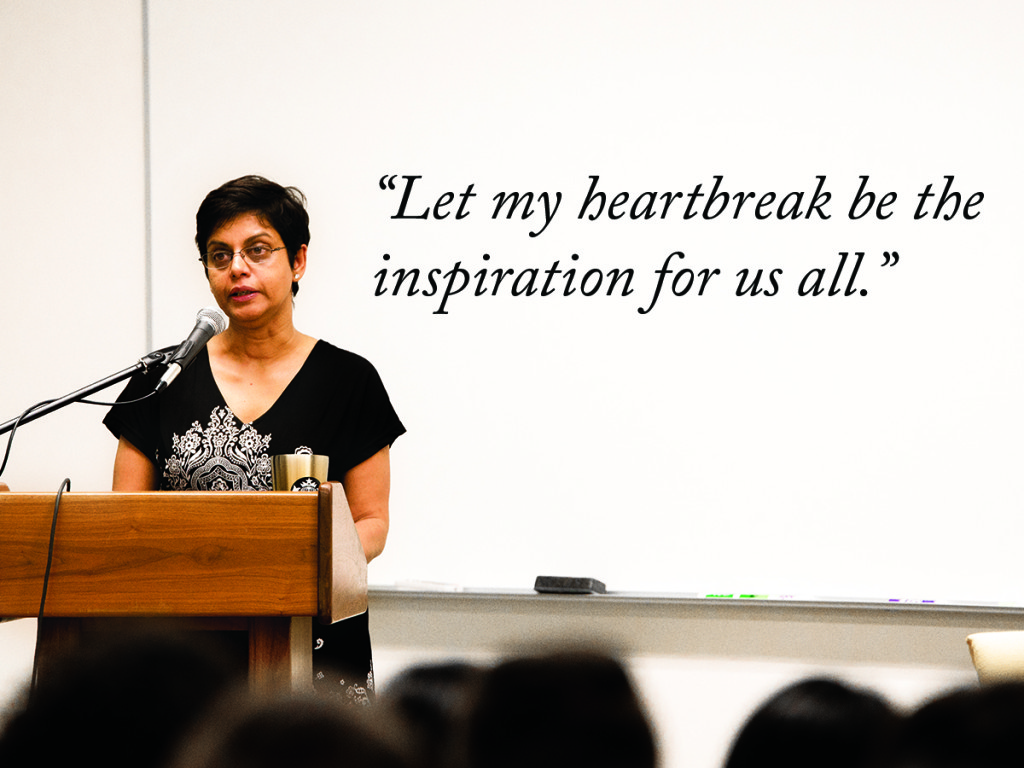
On Feb. 29, Rafida Ahmed, a Bangladeshi-American writer and blogger, gave a lecture entitled “Machetes, Fundamentalism and Rationalism: What does history tell us?” to a packed crowd of over 100 people in INTS 1113. The event was sponsored by the University Honors Program, the UCR Center for Ideas and Society, UC Riverside’s departments of earth and political sciences and the John A. and Betty C. Moore Science as a “Way of Knowing” seminar series.
Ahmed began by discussing a machete attack on her and her husband Avijit Roy by members of the Ansarullah Bangla extremist group after a book-signing at the Ekushey Book Fair in Dhaka, Bangladesh on Feb. 26, 2015. Ahmed suffered severe neural trauma after being stabbed numerous times with machetes, while her husband’s injuries became fatal. Both were prominent secular activists and bloggers in the country and were heavily critical of religious fundamentalism.
“But this is not the end of the story, it’s actually the beginning,” Ahmed explained. “Avijit was perhaps the most prominent victim of these machete-wielding assailants, but he was neither the first nor the last victim. Since this martyr, at the end of February Islamist fundamentalists killed another four bloggers in broad daylight.”
The blogger then discussed the history of Bangladesh, which was part of British India, and later Pakistan (known as East Pakistan) after the Indian partition in 1947. After the Bangladesh Liberation War in 1971, which occurred due to Pakistan’s intervention in the country’s 1970 elections and prevented the winning political party from taking taking office, Bangladesh became its own nation.
Since this transition, the country has faced numerous issues with free speech, according to Ahmed, through passing laws which prevent writers from discussing issues which may “hurt religious feelings,” under Section 295 A of the Bangladesh Penal Code. In addition, Ahmed stated that in the past 30 years there has been a rise in Wahhabi madrasa schools and students in the country, which are often funded by religious fundamentalists in oil-rich countries such as Qatar and Saudi Arabia. Wahhabism is typically viewed as an extremist sect of Sunni Islam, due to its conservative nature and fundamentalist philosophy.
“The political and social landscape radically changed. Religious fundamentalism rose in Bangladesh, just like many other countries in that region … Our so-called secular government has decided to side with the religious fundamentalists. They stayed completely quiet after Avijit’s death. After the killings of the four bloggers … The prime minister said, ‘We do not support these killings, but nobody should be allowed to hurt anyone’s religious feelings,’” Ahmed elucidated.
The government eventually arrested five people in connection with the attack on Ahmed and her husband; however, she remained skeptical that they were involved. Ahmed explained that she does not seek revenge against the assailants due to the attack, but she does want them to face justice for their crimes.
Ahmed also highlighted the fact that these events are not unique to Bangladesh and that religious fundamentalism inhibits secular freedoms across the world, including the U.S. “We see that presidential candidates rejecting the well-standing theory of evolution, denying the impacts of global warming, or pleading to overthrow the rights of abortion, which was earned through a very long struggle to establish equal rights for women. These are all done in the name of religion. They want the Bible to trump the secular constitution,” explained Ahmed.
For Ahmed this attack held further implications beyond these issues of civil rights across the world and her mental, emotional and physical health.“Machetes don’t only take lives. It actually tries to kill our best evolutionary abilities and survival skills as a human being. Our creativity. Our intellectual being,” Ahmed asserted. “We have seen again and again throughout our history whenever we lost our right to question anything and everything in our society, great cultures went into a downward spiral. We have seen this in the Dark Ages in Europe. We have seen this in the Islamic world.”
After the presentation, Professor of Earth Sciences Nigel Hughes asked the writer a few questions which discussed the issue of civil rights in Bangladesh. “You talked about this sentiment of ‘hurting religious feelings …’ Can you expand on this idea?”
“I think before we had this idea of democracy … It was enough to say … ‘we have have the right to kill you or imprison you because you said something against the Quran or Bible’ … That is what ISIS (the Islamic State of Iraq and Syria) still does.” Ahmed answered. “Somehow this has started in countries like ours, where the government is saying we can actually put you in jail for hurting religious feelings. I want to do more research to see where we started this.”
Afterward, a Q-and-A was held with the audience. One member asked, “What is the status of the blogs in Bangladesh?” Ahmed explained that these websites, including her husband’s blog entitled Mukto Mona (Free Thinkers in Bengali) are still running in full force.
“Our species have roamed around the Earth for 200,000 years. We are 7 billion strong now. We have accumulated massive wealth of knowledge and resources … It might sound ironic but I think that death makes someone larger than life. That’s what happened to Avijit … He is actually working as a symbol. Not only to fight for freedom of expression. Not only for the free thinkers. He is working as a symbol to speak the scientific truth … Let my heartbreak be the inspiration of us all,” Ahmed concluded.








